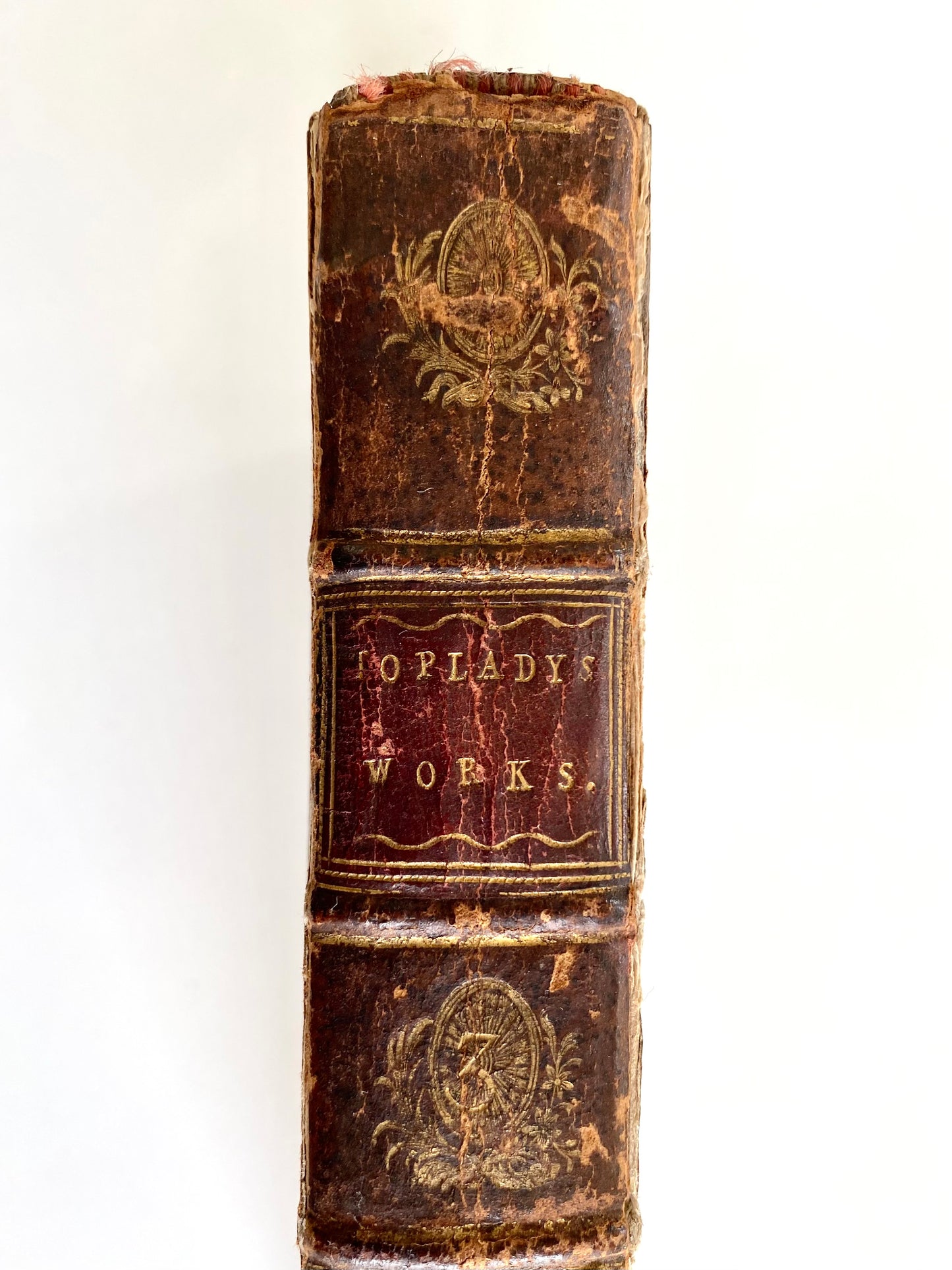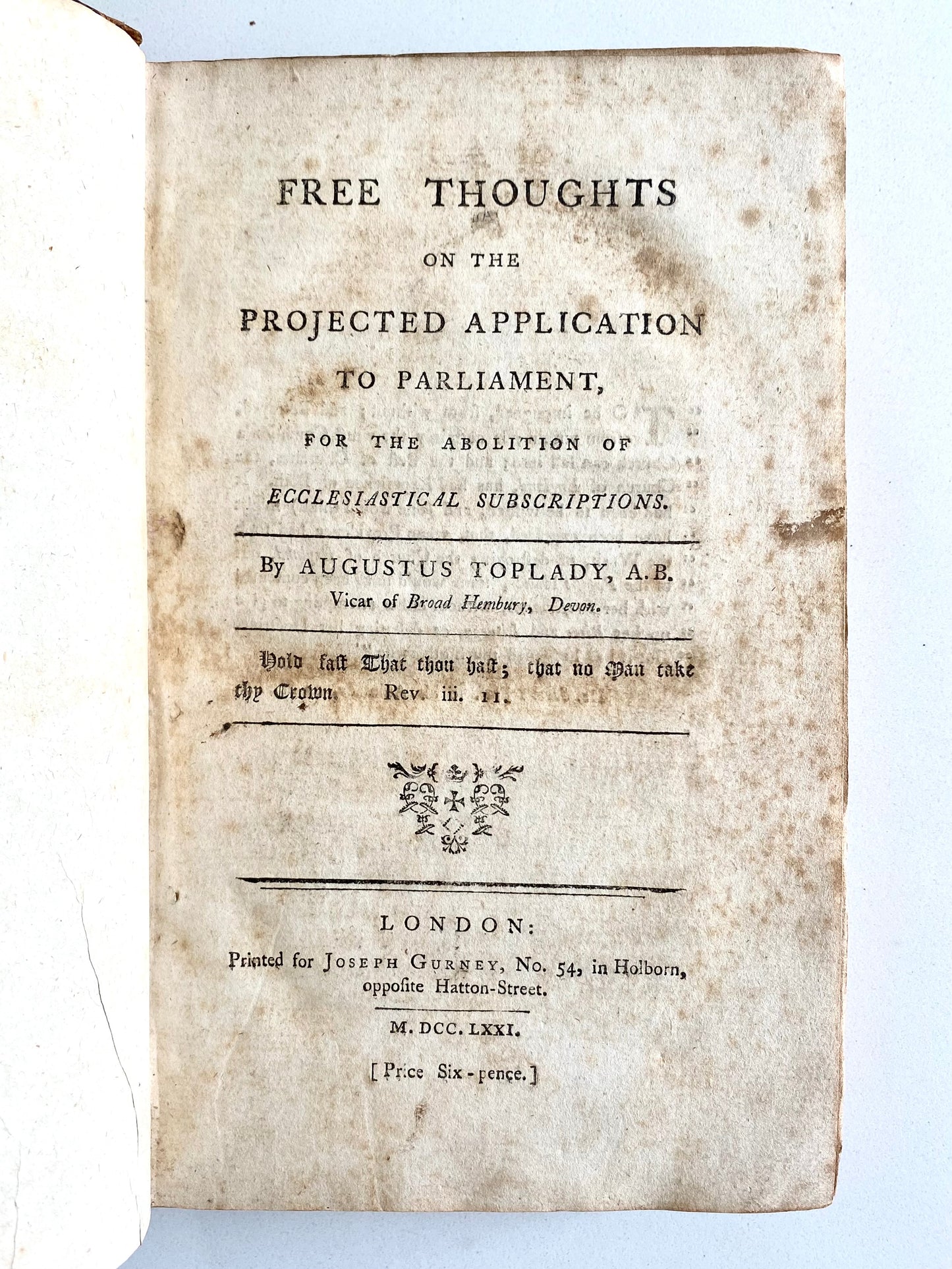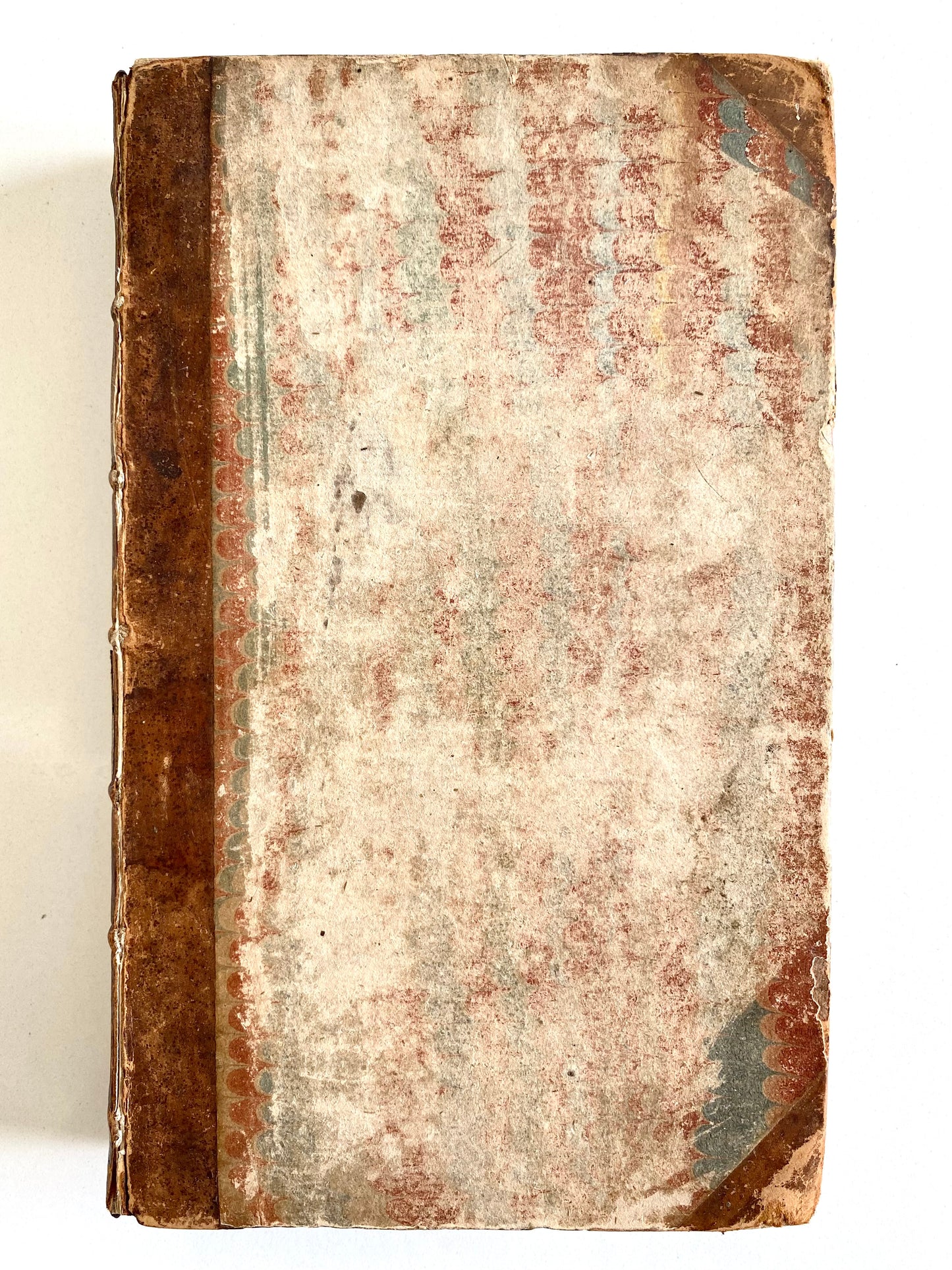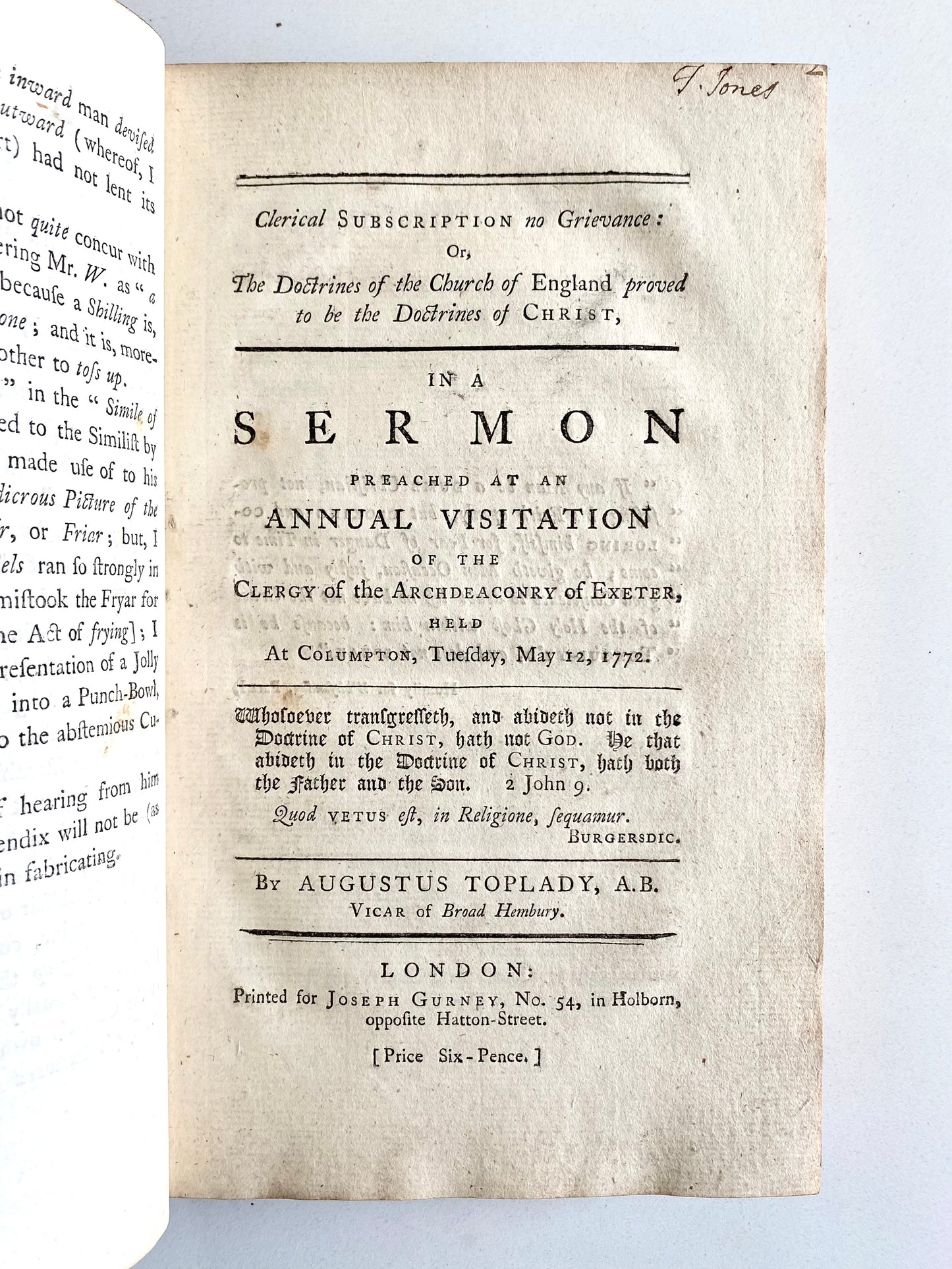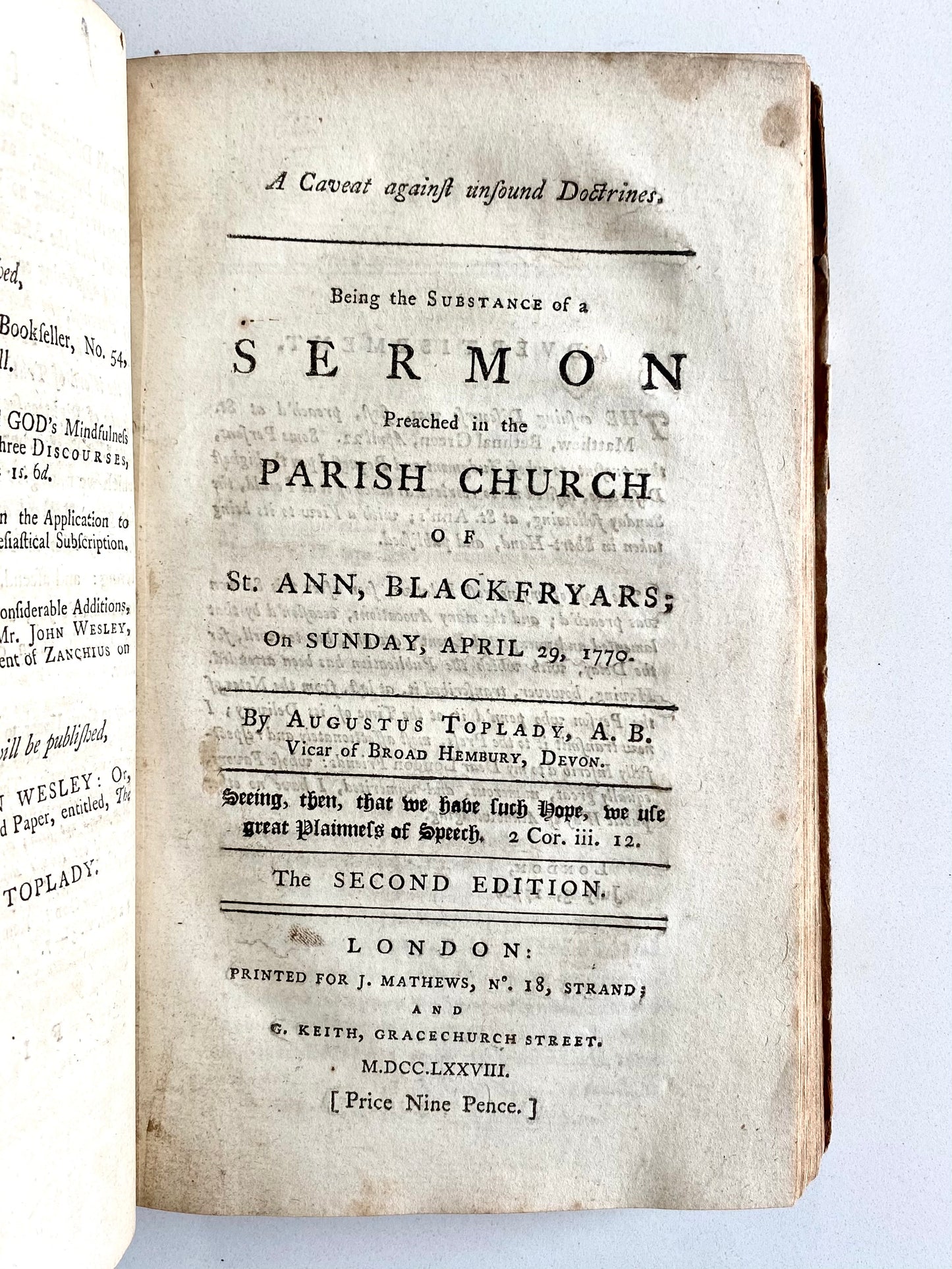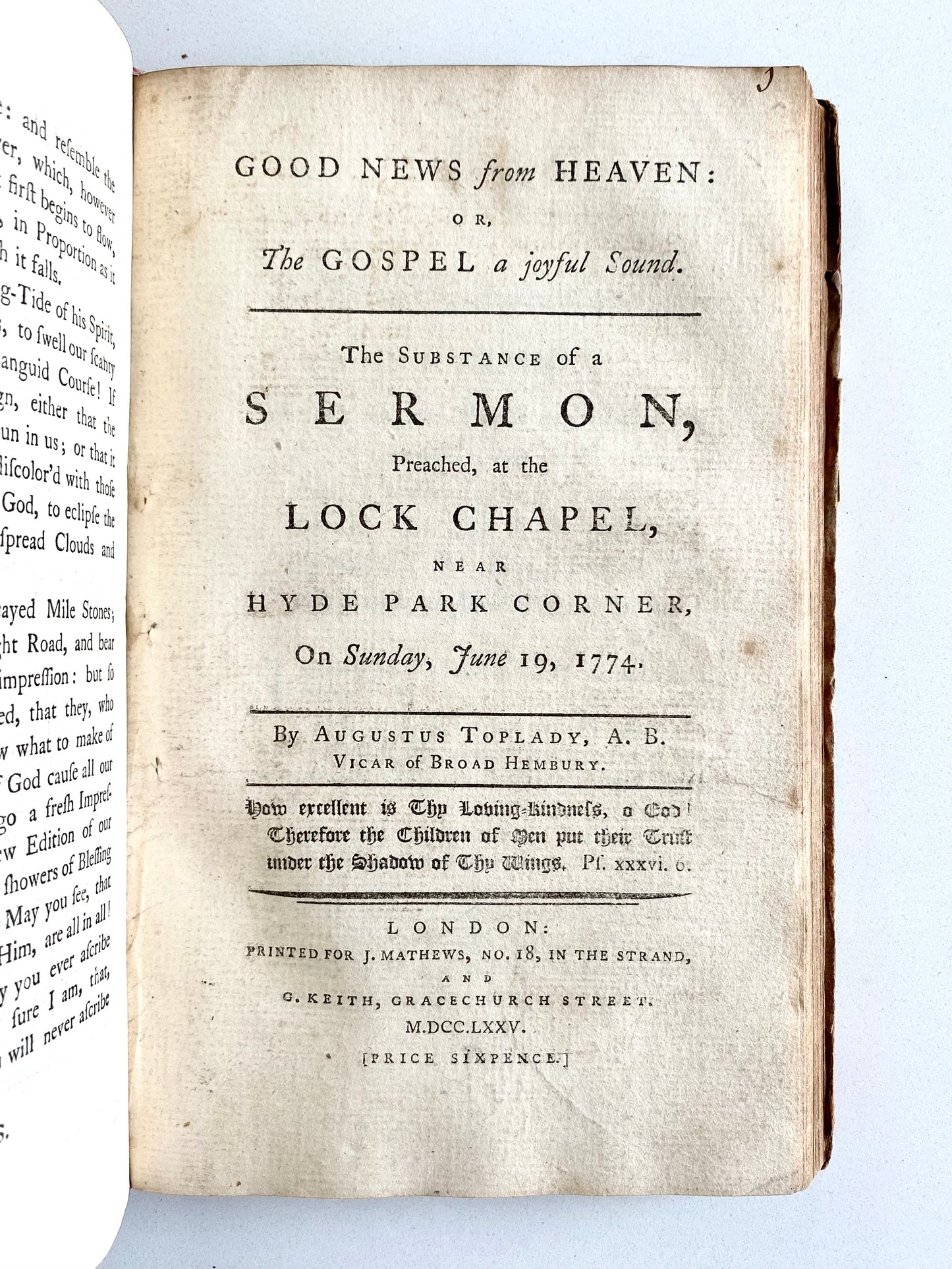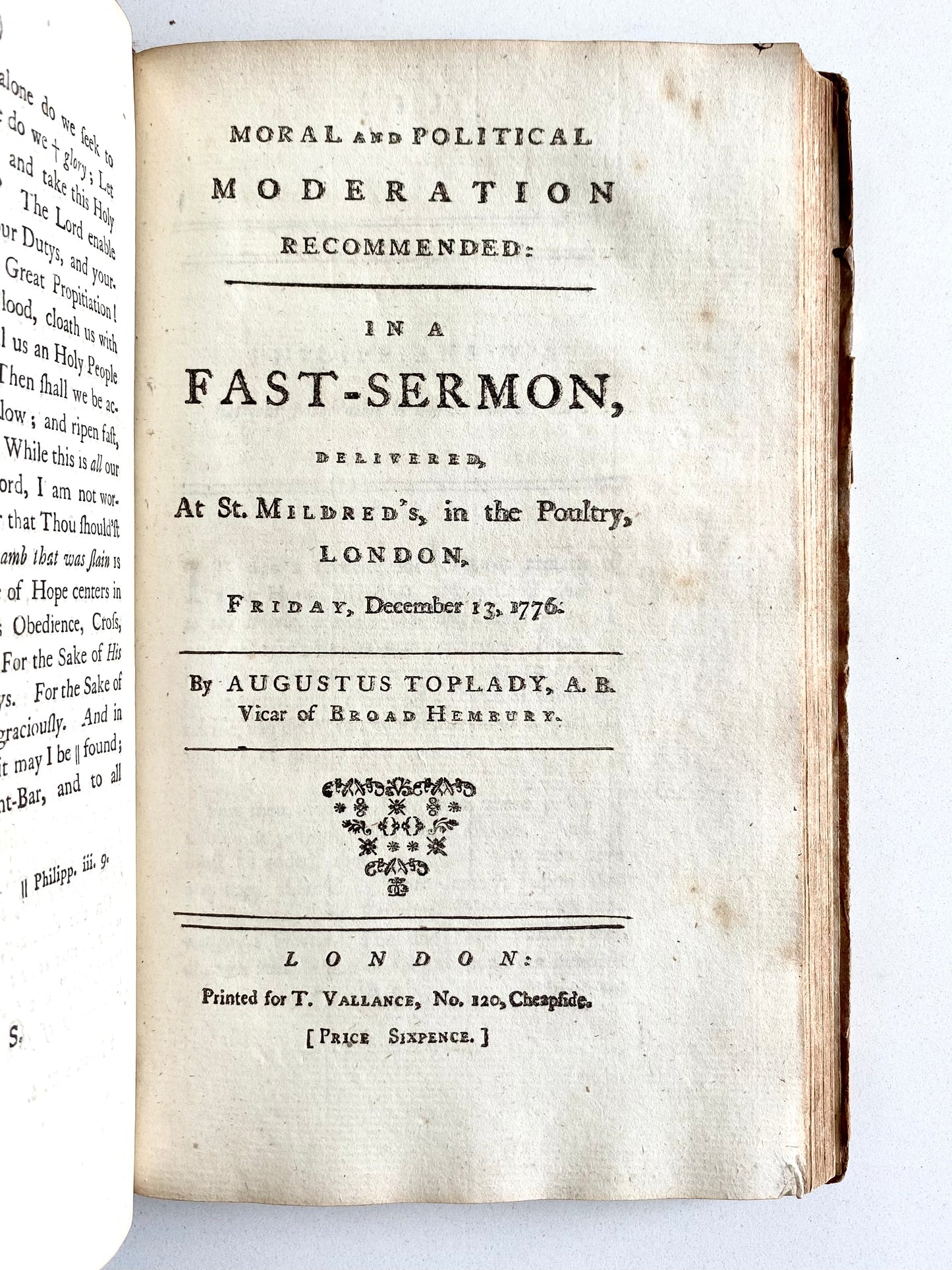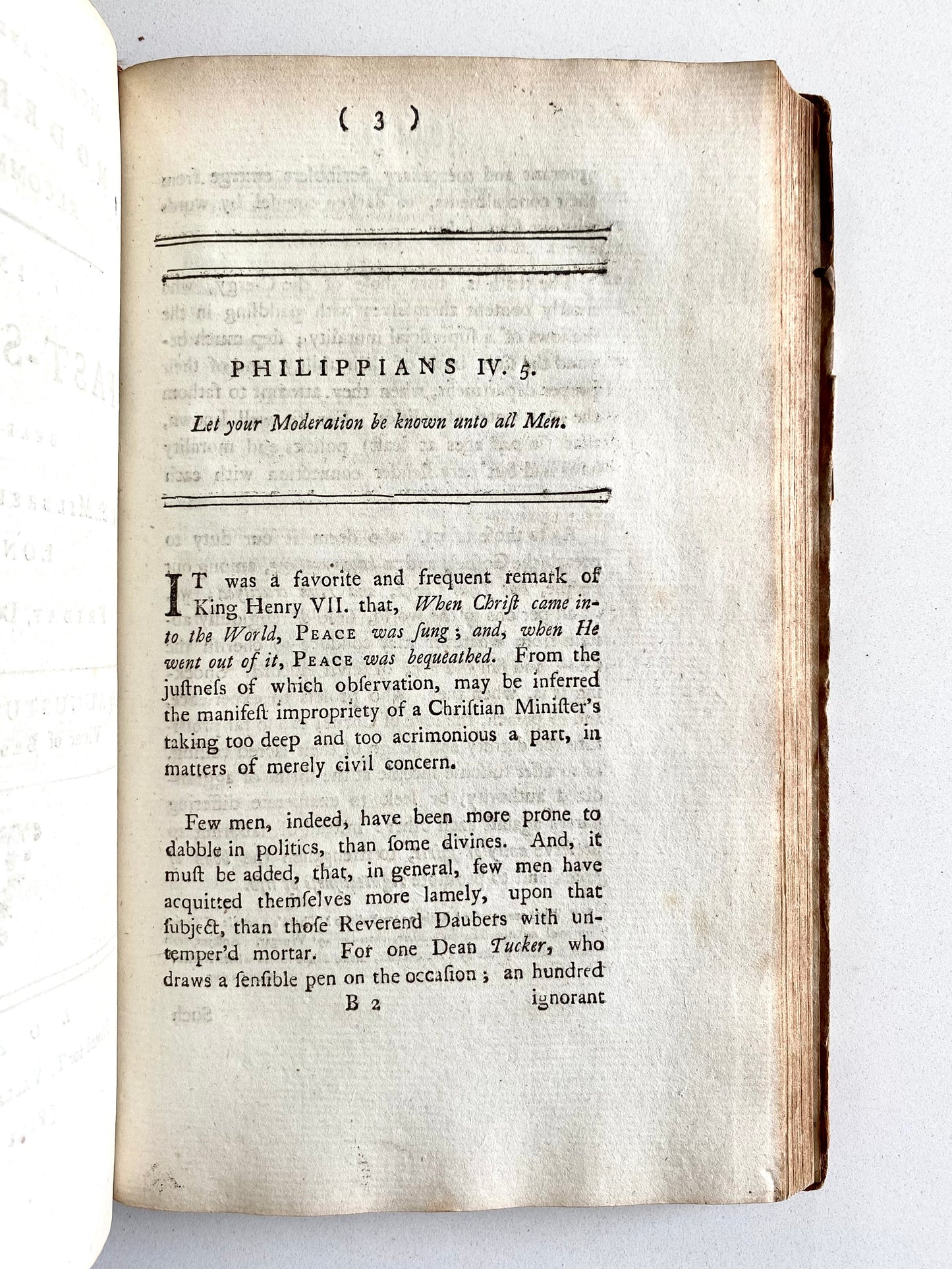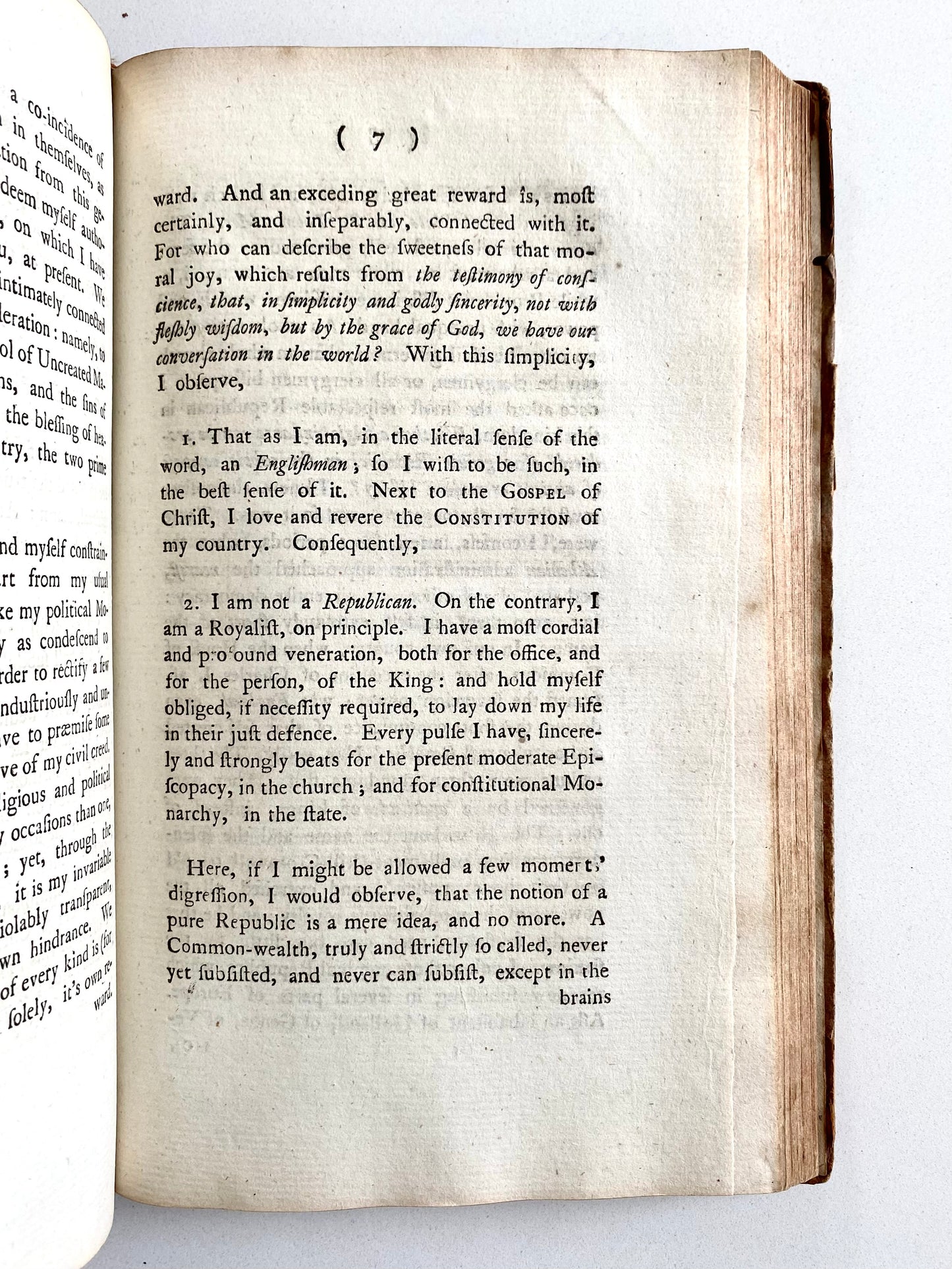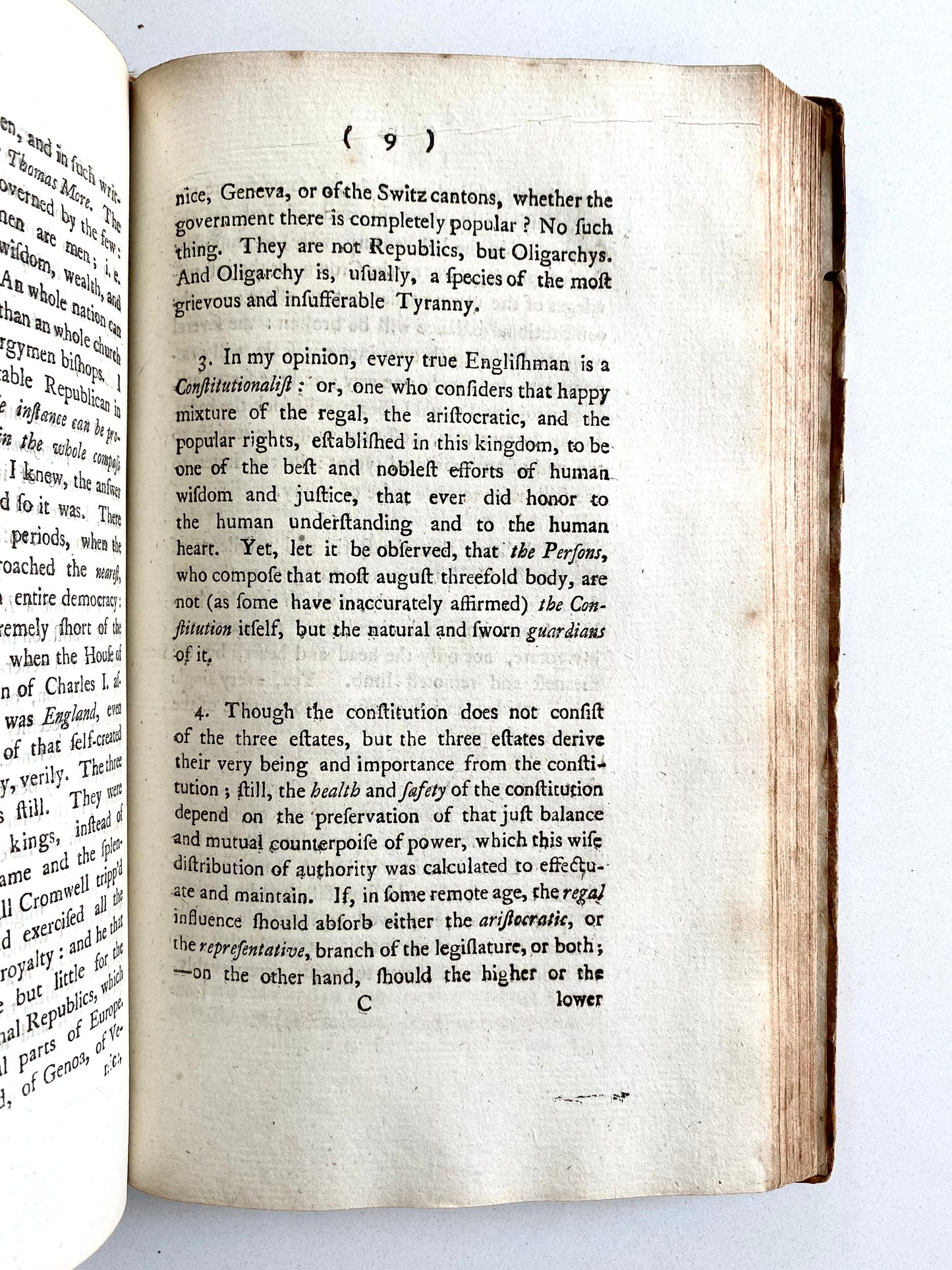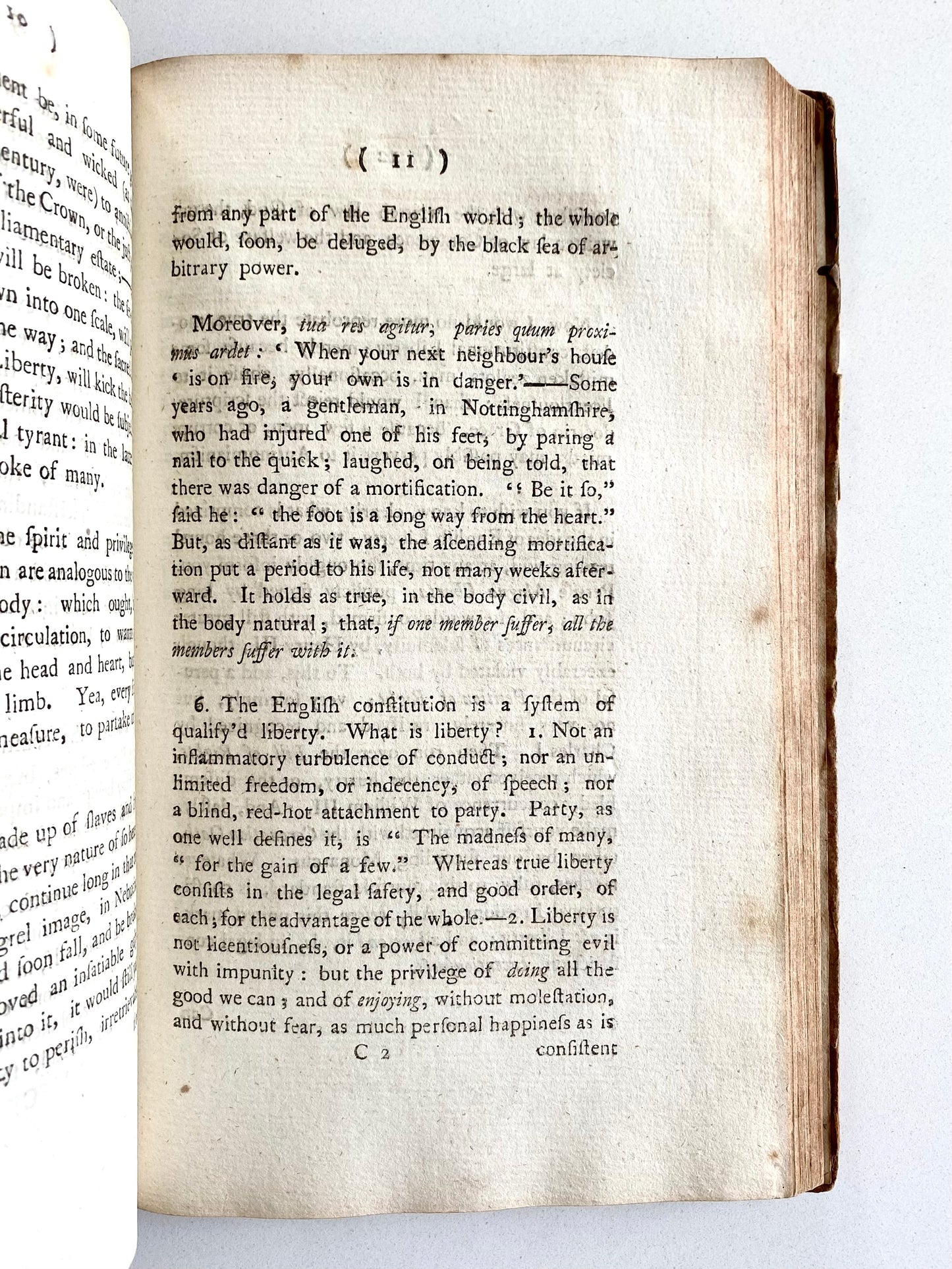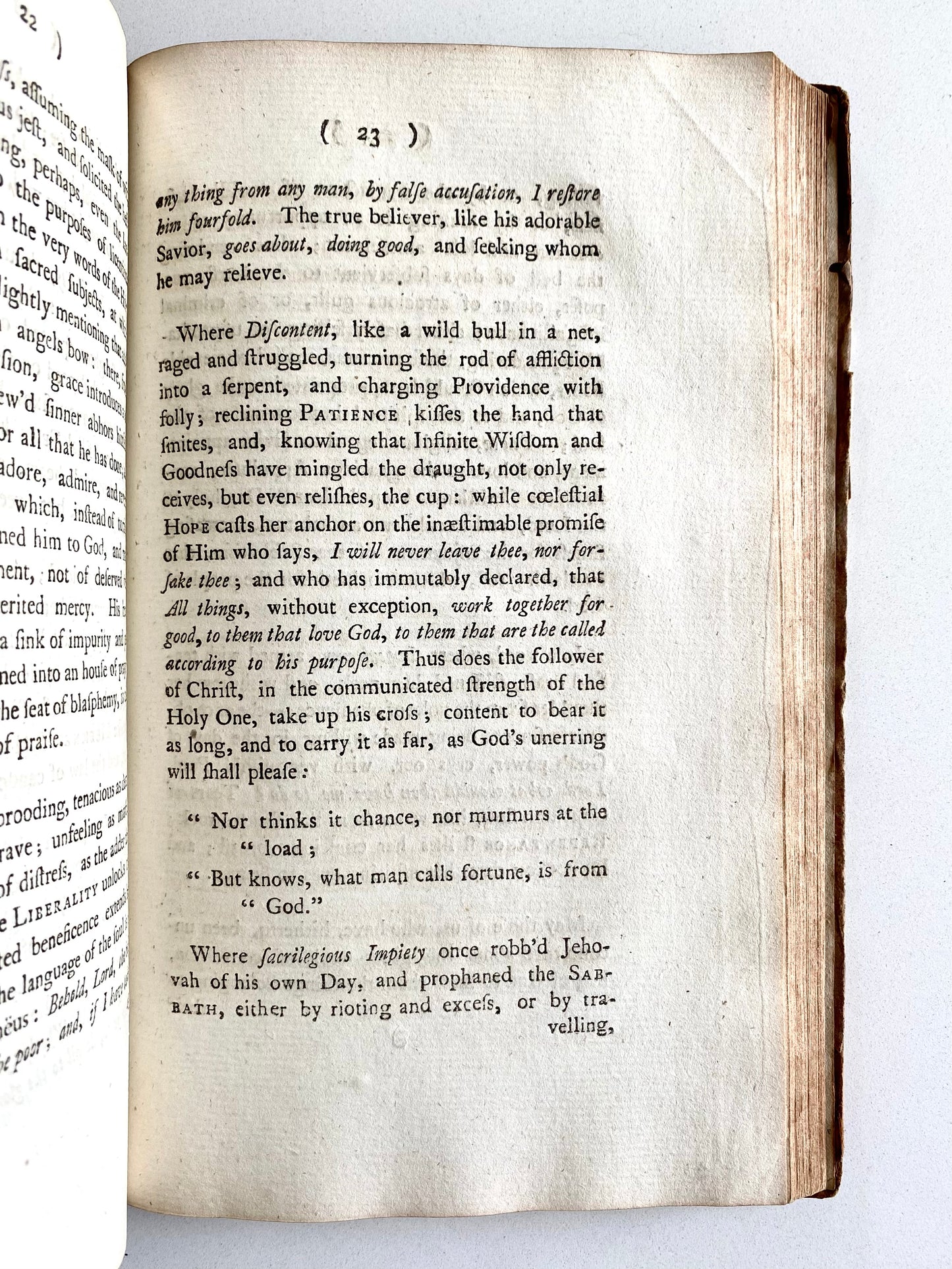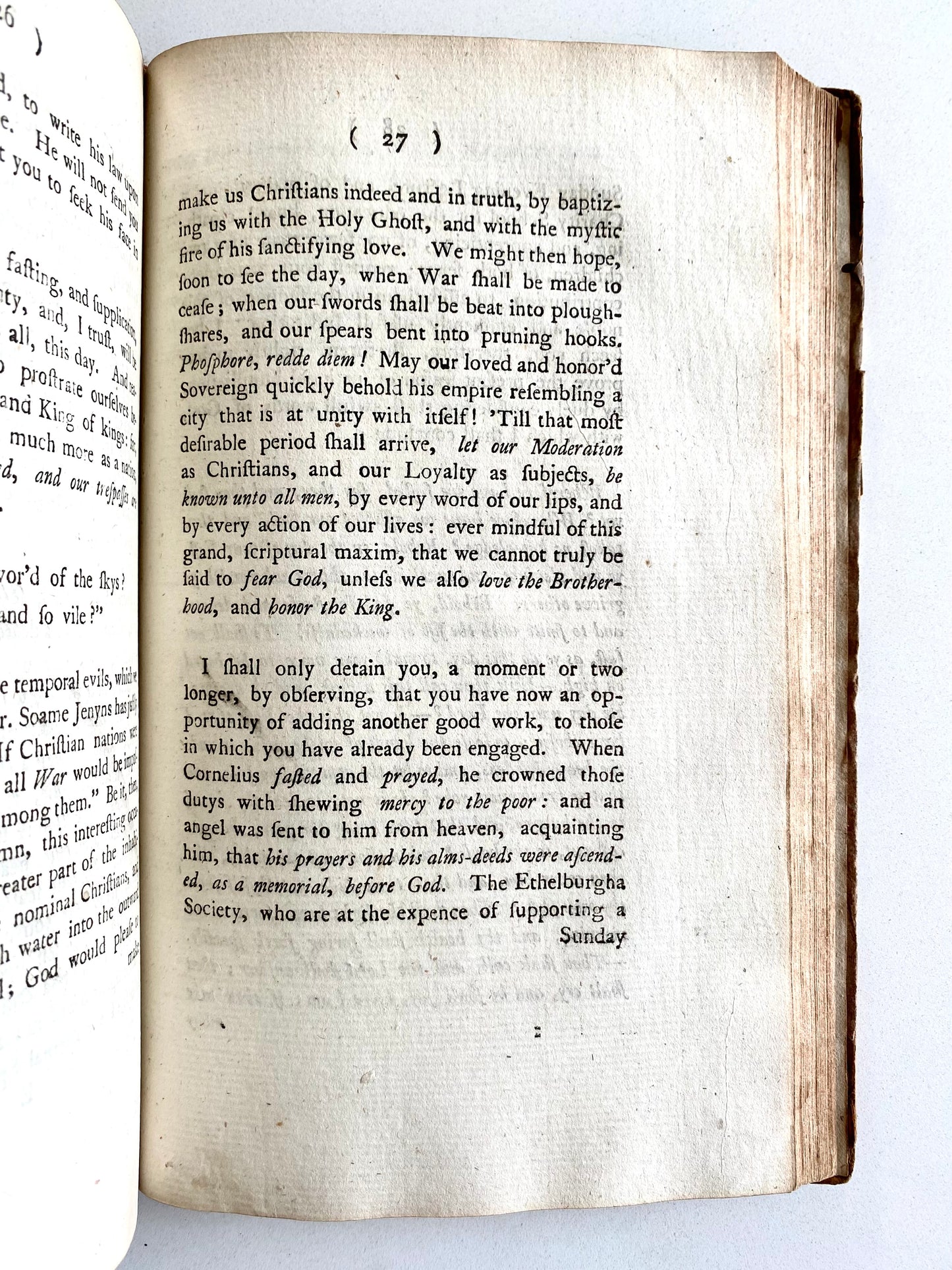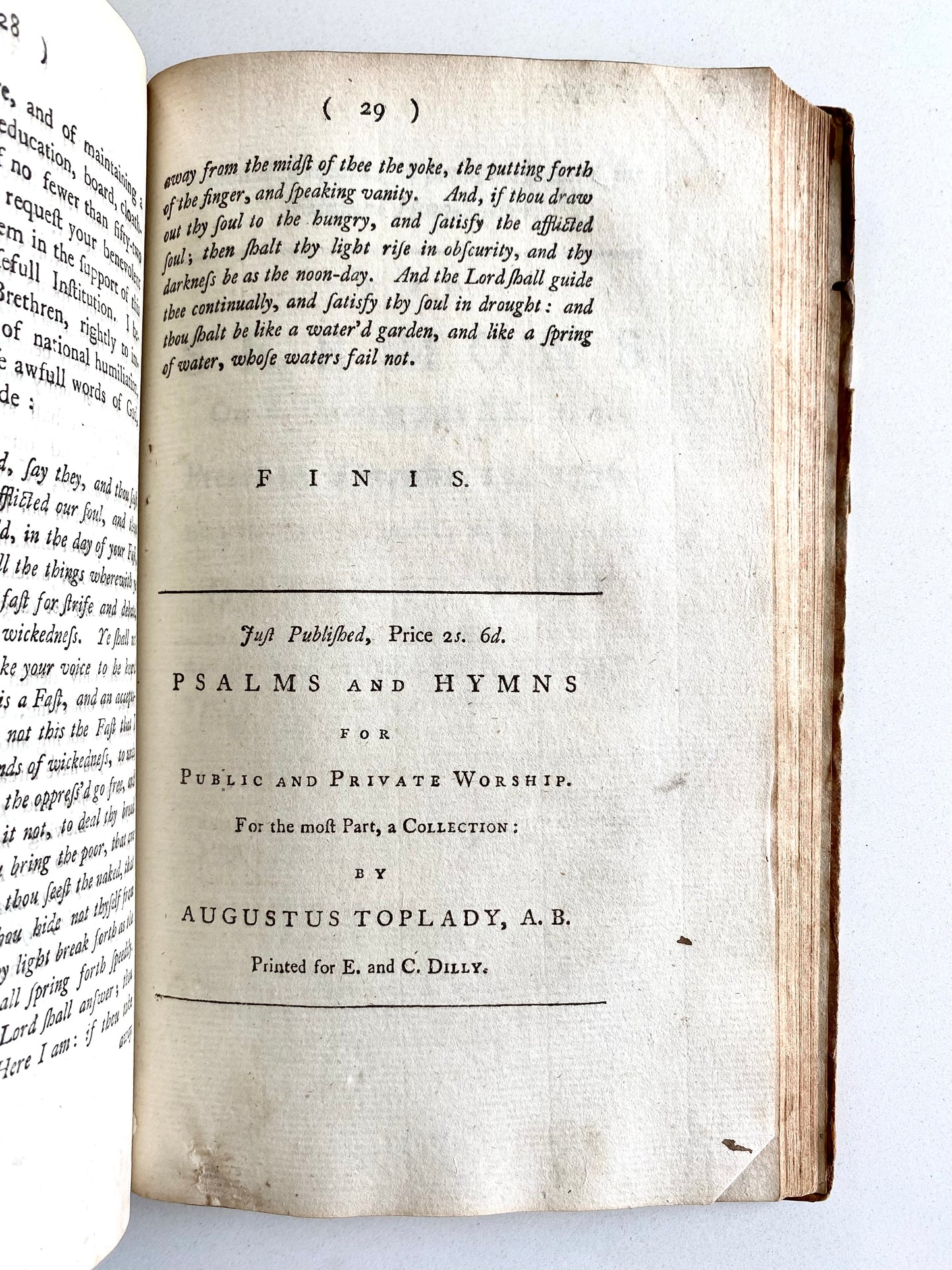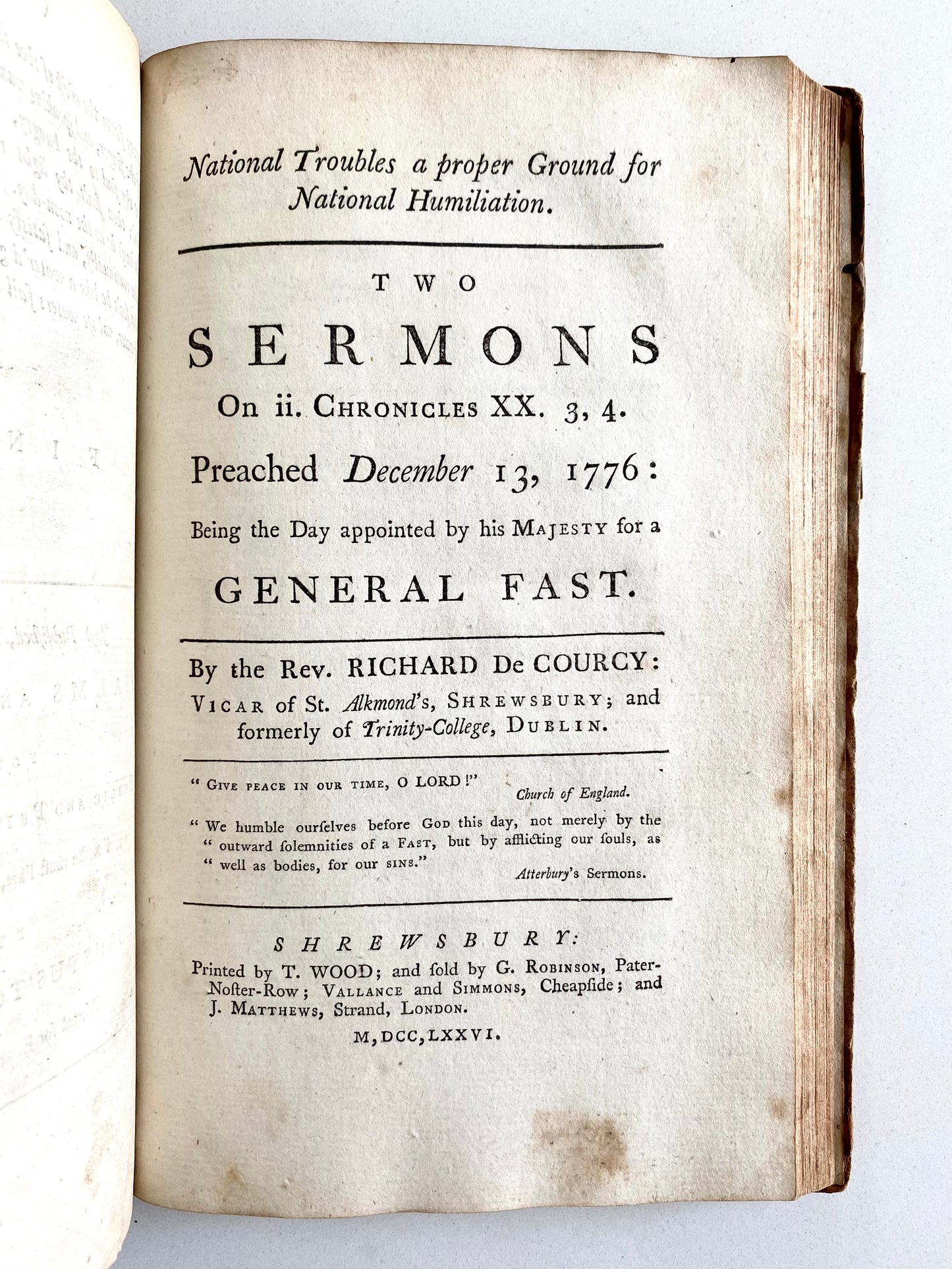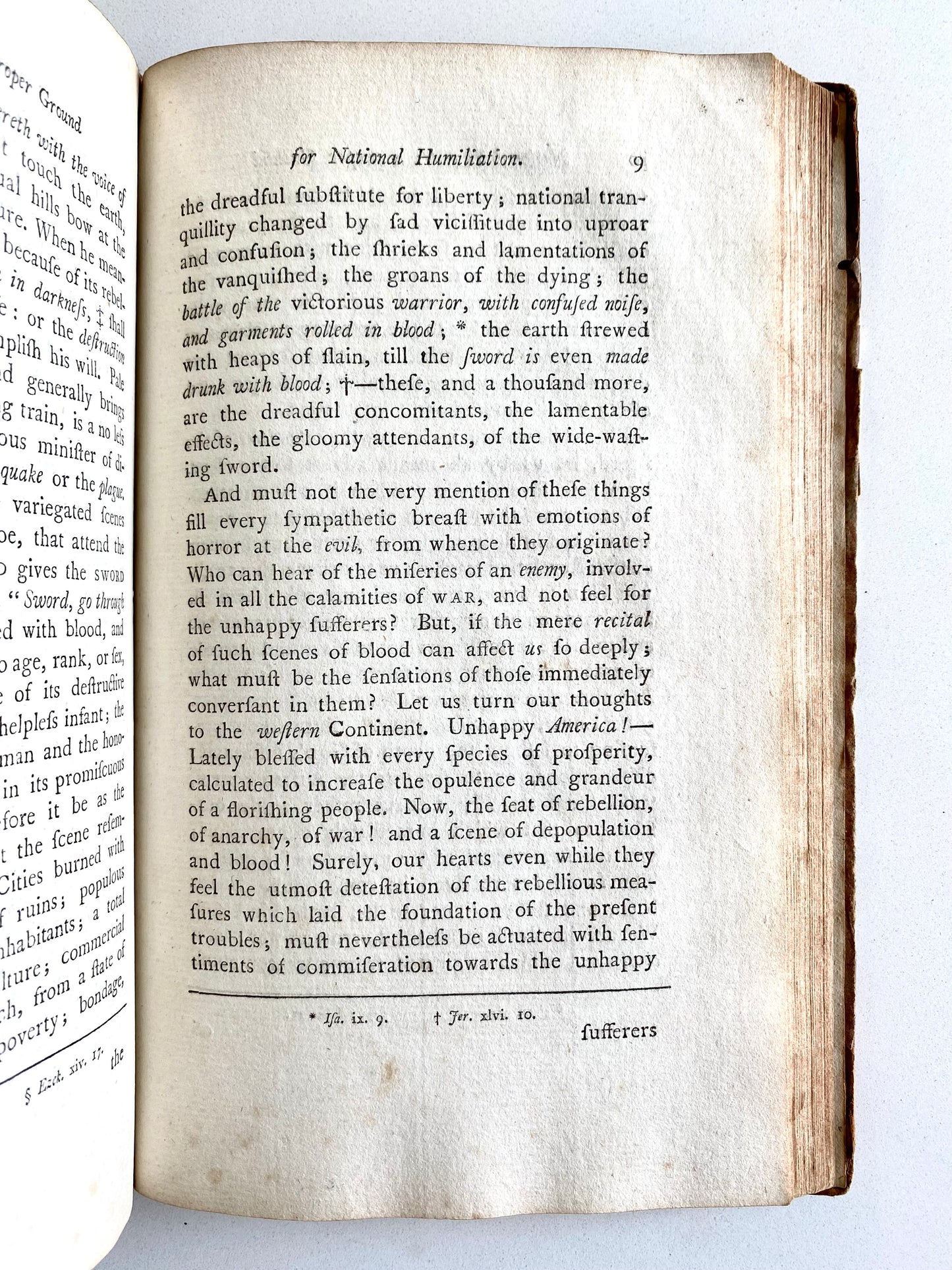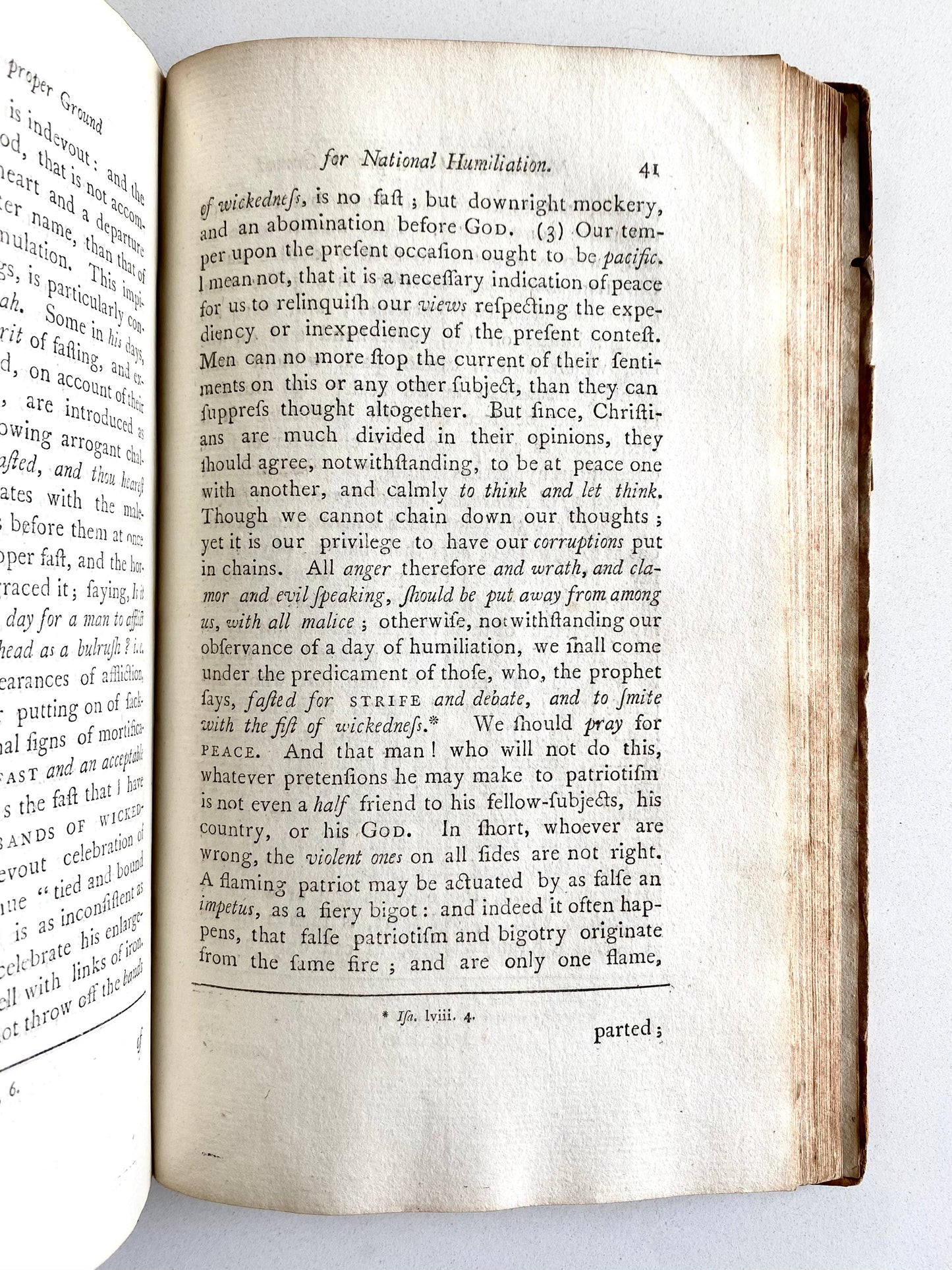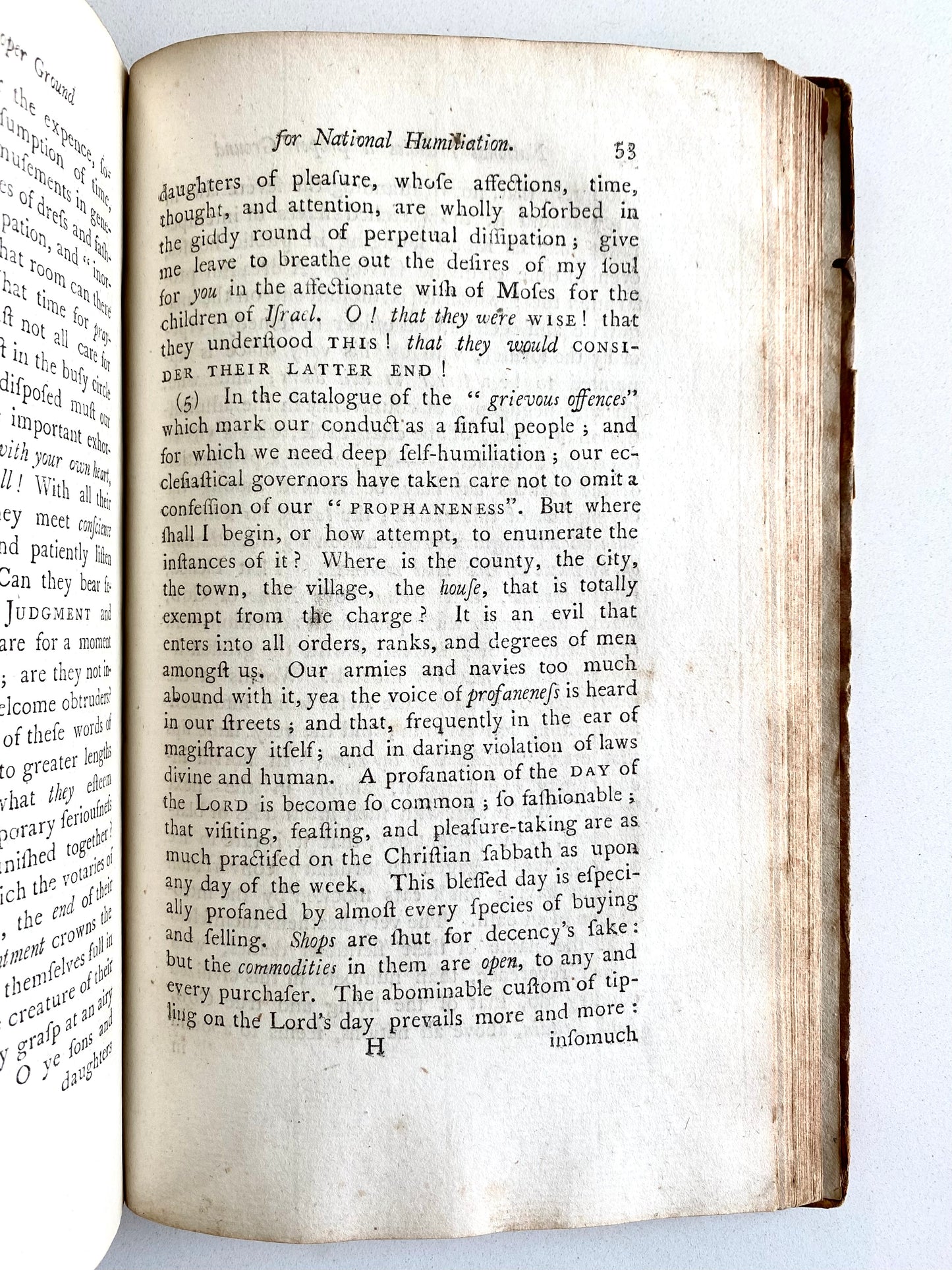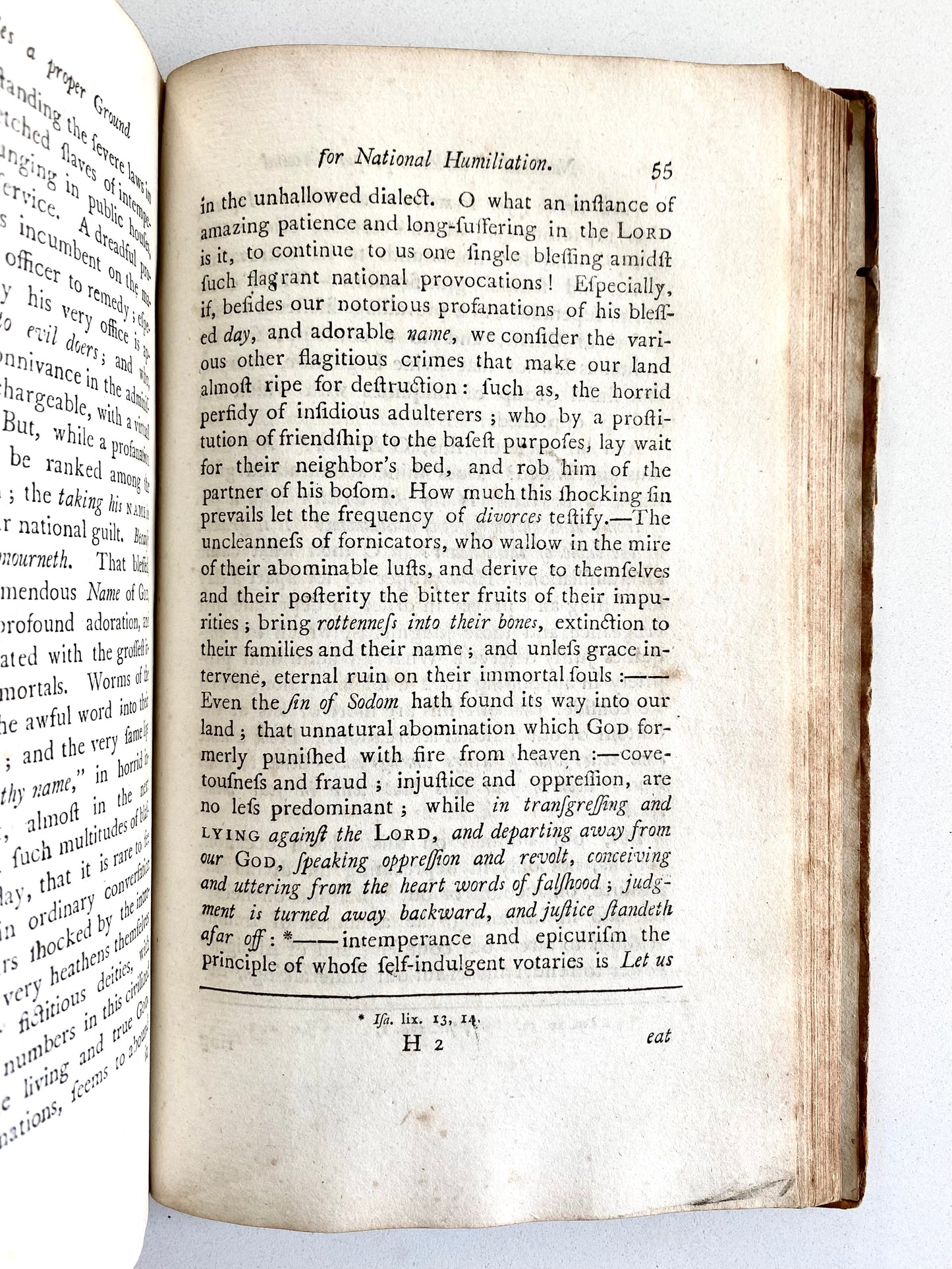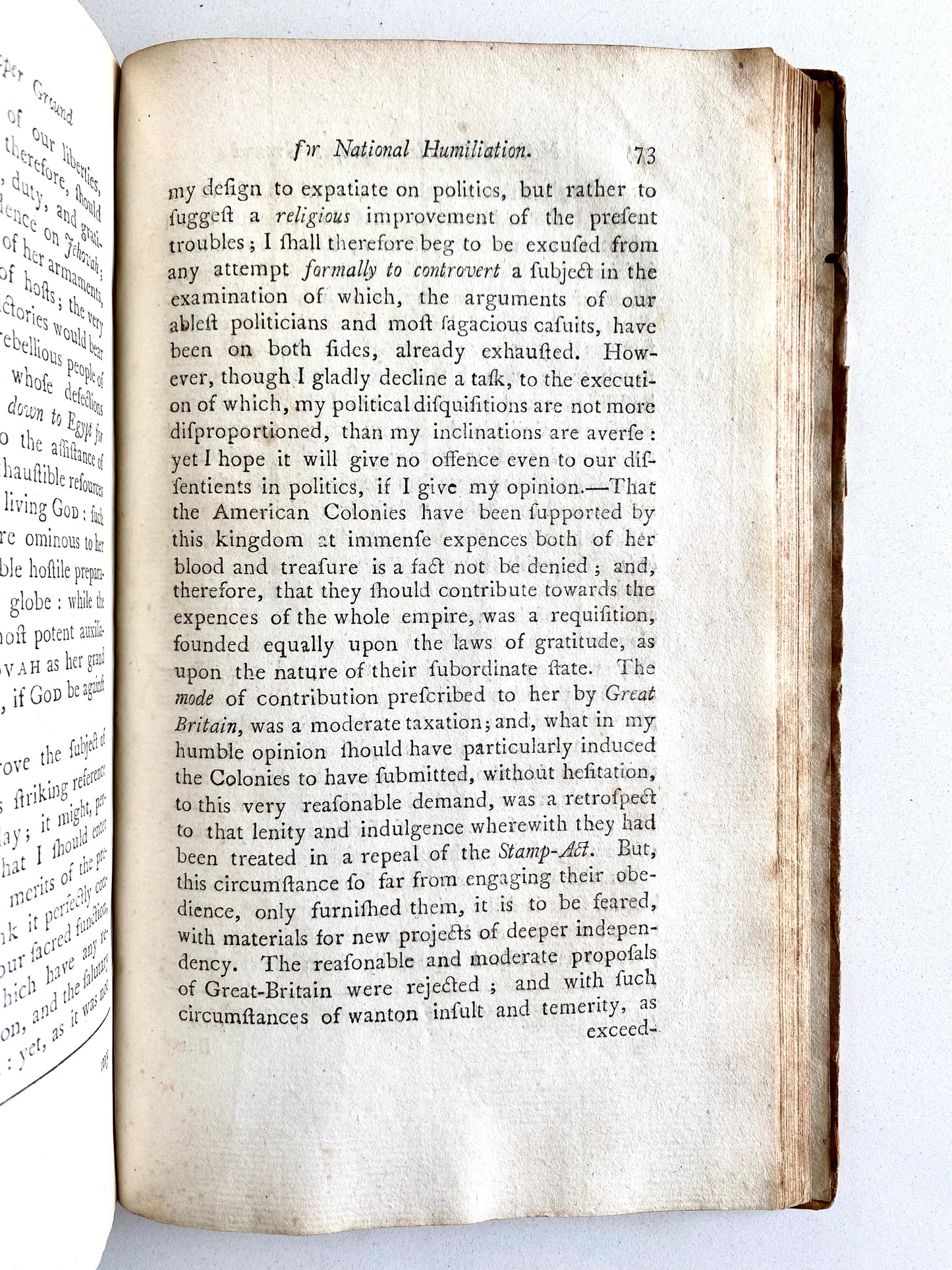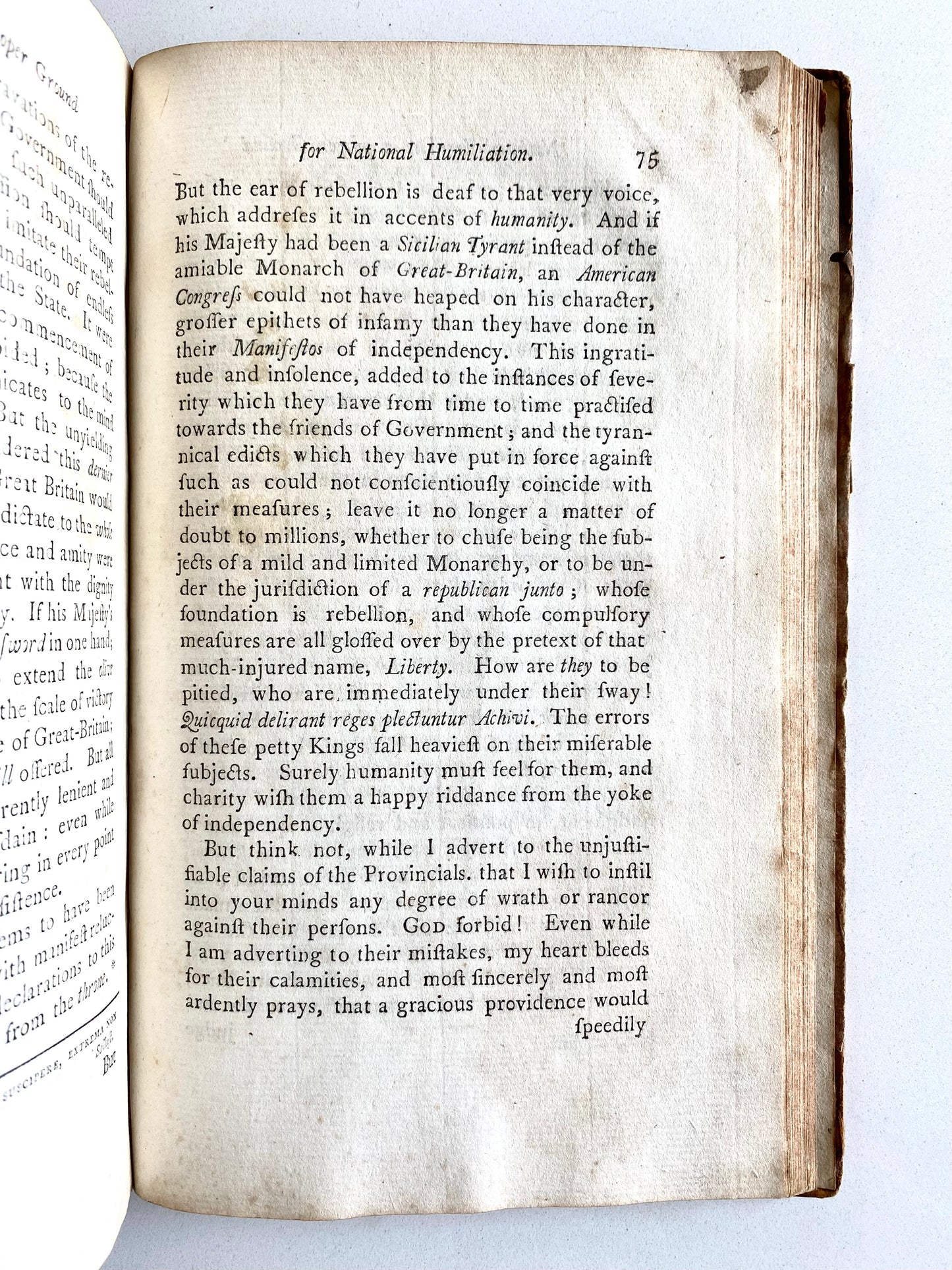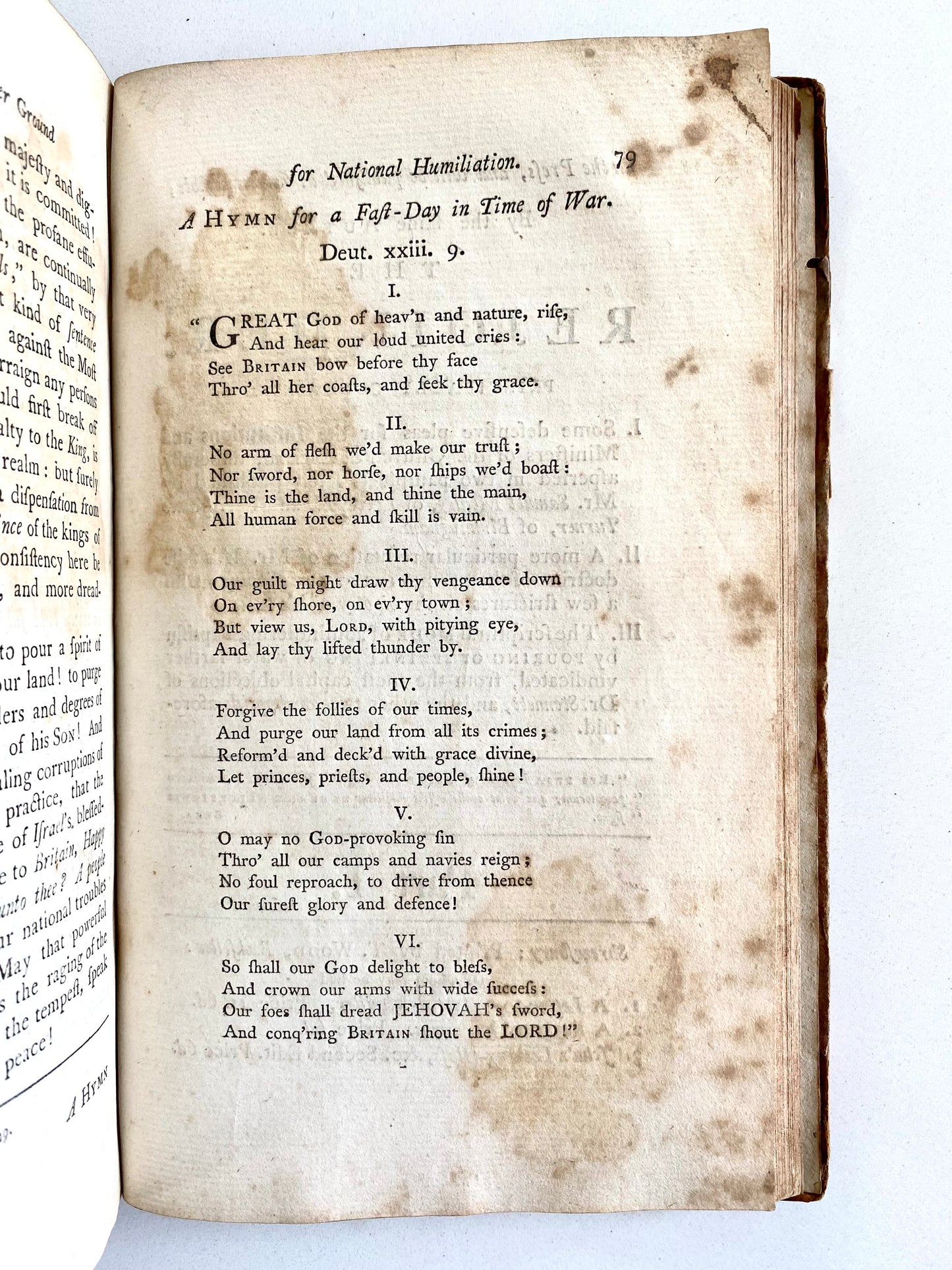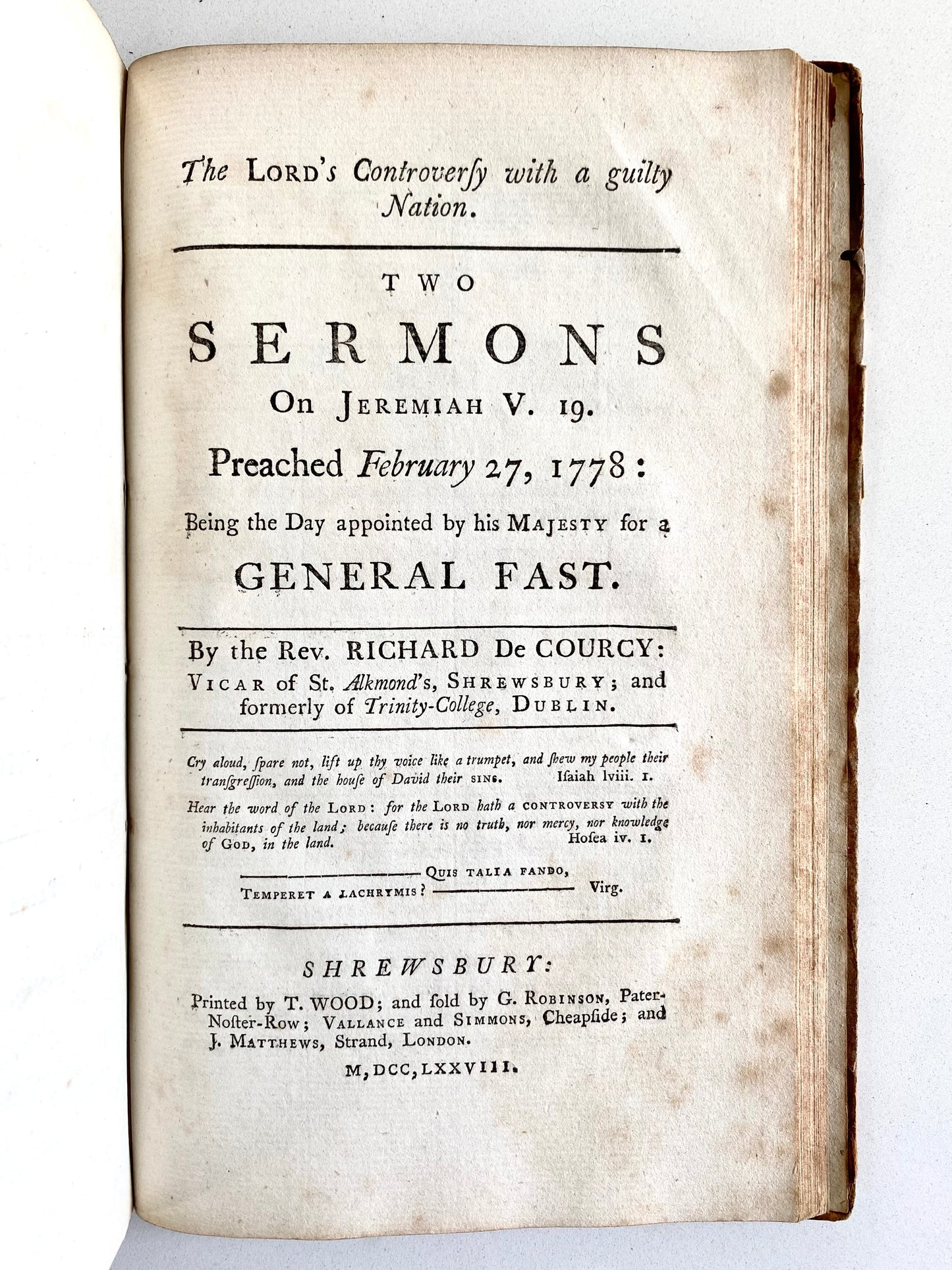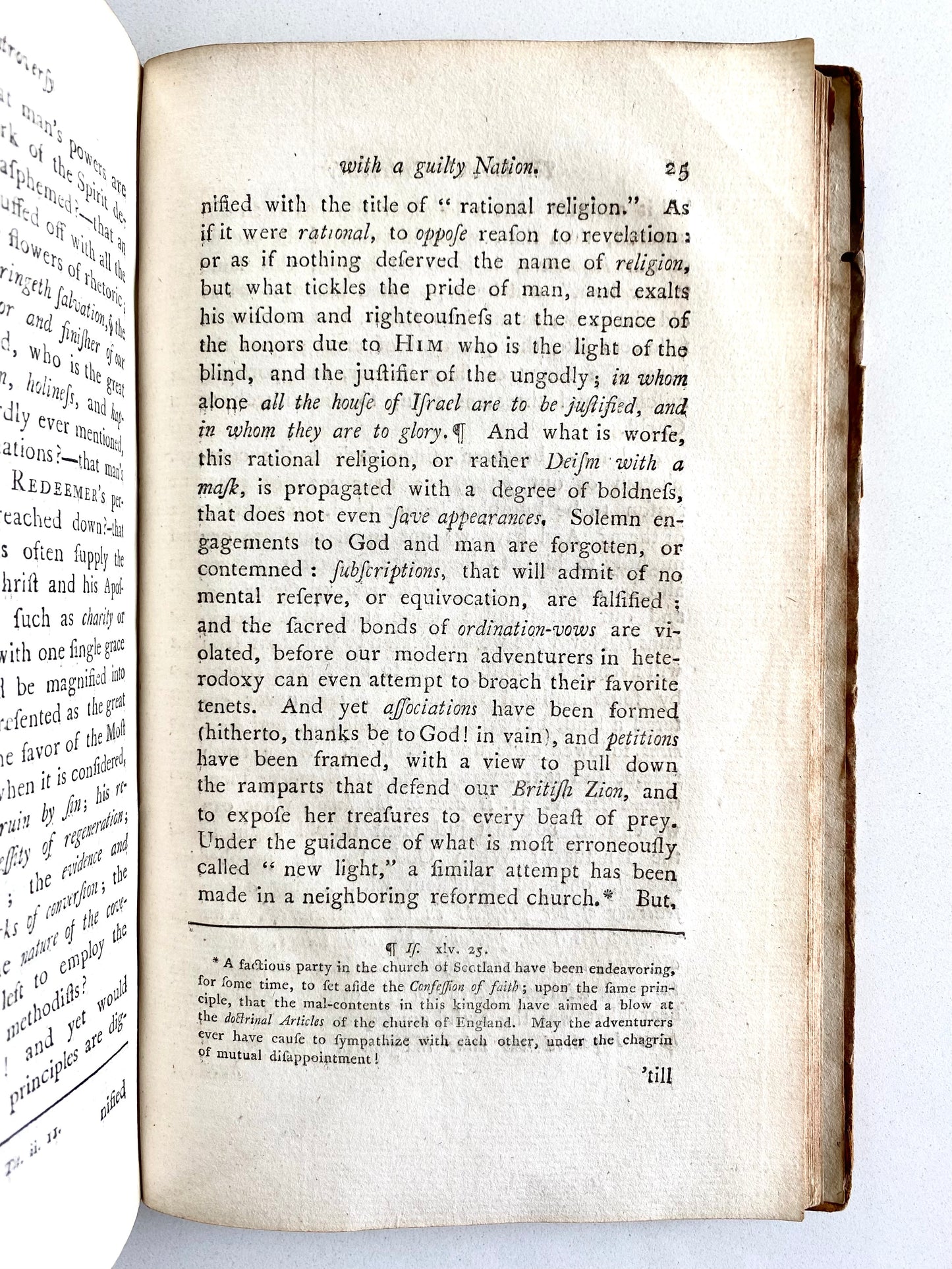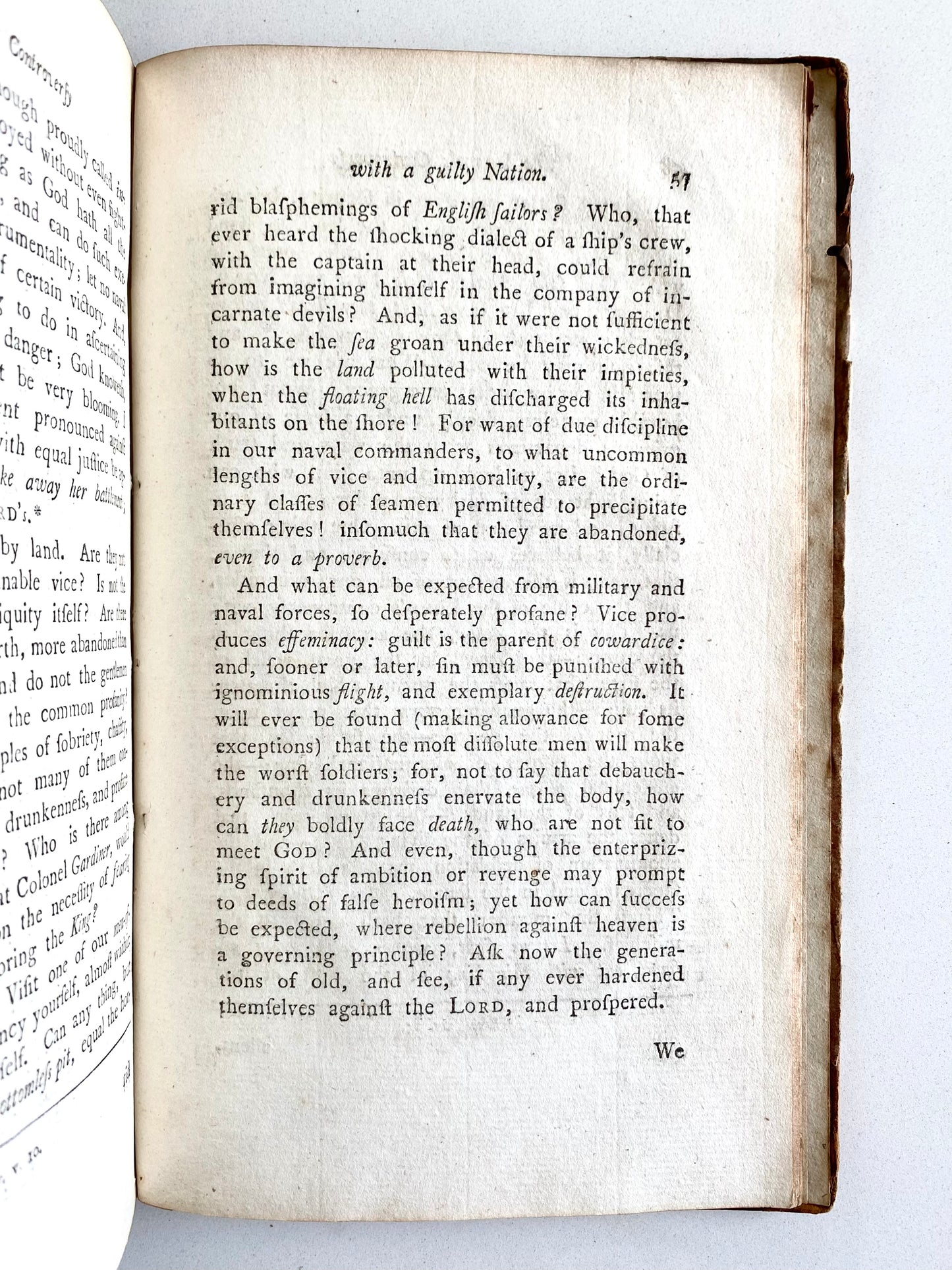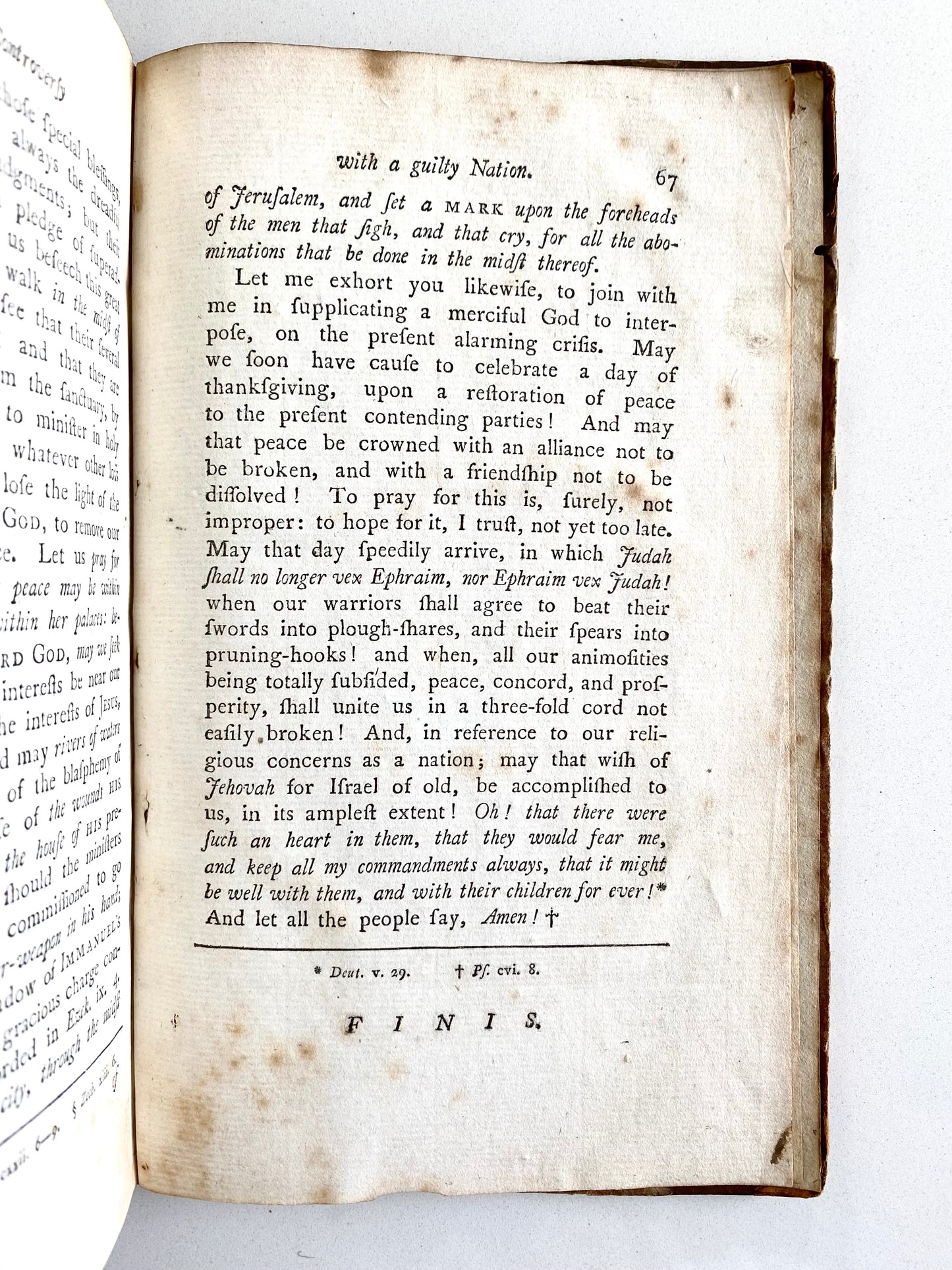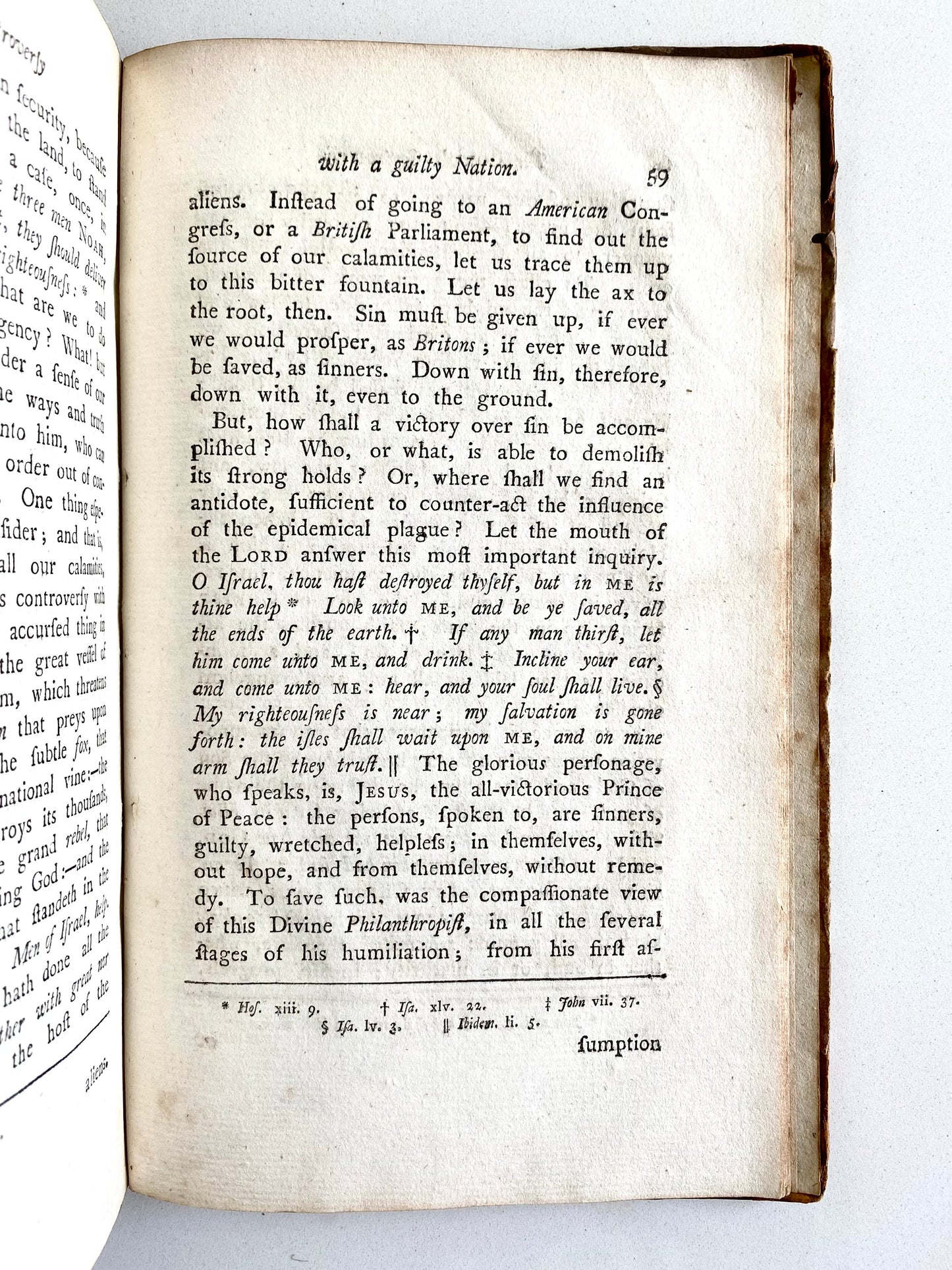Specs Fine Books
1776 AUGUSTUS TOPLADY. Sammelband of Sermons on American Revolution & John Wesley, &c.
1776 AUGUSTUS TOPLADY. Sammelband of Sermons on American Revolution & John Wesley, &c.
Couldn't load pickup availability
A fantastic sammelband of scarce Augustus Toplady imprints and American Revolutionary War related sermons.
Toplady [1740-1778] was a robustly Evangelical Anglican of the old Calvinistic vein. Remembered today as the author of Rock of Ages, he was also a rather public and vehement opposer of John Wesley, who dismissed him as a "chimney sweep" whom he would not respond to as it would dirty his hands. He was also of that section of the Great Awakening that believed the proper channel for the season of grace was to reinvigorate the Anglican church as the true and rightful Church of England.
The present volume contains important works by Toplady in sort of three sections. In the first section, sermons against the Dissenter's protest regarding the payment of tithe and the allocation of funds to the Anglican Church in England. It then moves to works, again by Toplady, from the era of his disputes against John Wesley, Methodism, and Arminianism generally.
The final section, containing one work by Toplady, and two works [comprised of four sermons] by Richard De Courcy, contains three exceptionally scarce works on the American Revolutionary War. None of the three works have turned up at auction in a long time; fascinating religious interaction from faithful, Evangelical divines of England attempting to scrutinize the ethics of England's war against the American Colonies from a variety of perspectives. Only one late imprint of the Toplady 1776 sermon is on the market. It is a later edition, from the 1790's, and is priced at $1,200.00.
These fine works should be read in the context of other Christian interactions of the time. For example, John Wesley was at first supportive of the American Colonies' claims, then wrote against the American Colonies' desire for Independence. And then, when the War had begun, urged non-allegiance among Methodists since the war involved a situation where faithful Methodists were taking up arms against other faithful Methodists. This, for Wesley [and the Quakers more consistently] proved an ethical dilemma, to say the least.
The final works on the Revolution are by Richard de Courcy [b.1743]. He was a child of the Great Awakening who had been denied ordination in Dublin because of his Evangelical views. He was then taken under wing by the Countess of Huntingdon and supported as one of her travelling preachers. Then, through Lady Huntingdon's influence, he was at last ordained Bishop of Lichfield and later Vicar at Shrewsbury. His desire, even though rejected, to operate in the Anglican church was typical of many of those of the Great Awakening era and shows up in his view of the Revolution. He published Some Elegiac Lines Upon the Death of George Whitefield, etc., and was a leader in the second generation of the Great Awakening divines.
While Toplady seems to have taken a more moderate view, consistent with Wesley's stance during the American Revolution, De Courcy works his theology out of His view that England is a special nation, and that the Church of England is also a special church; which views of course early Americans adopted as their own in terms of Government, but not in terms of religion in general [though still believing Christian government to be the best]. De Courcy pities the Colonies, almost patronizingly at points, since they are sure to be ground under the wheel of British force and God's judgment for their Absalom-like rebellion against God and God's country. His heart breaks for the Americans, but for him, the right of the Crown to govern and the sinful presumptuousness of the American colonies will yield a brutal result that is both natural and spiritual.
A fascinating and important grouping.
Toplady, Augustus. Free Thoughts on the Projected Application to Parliament, for the Abolition of Ecclesiastical Subscriptions. London. Joseph Gurney. 1771. First Edition.
[bound with]
Toplady, Augustus. The Doctrines of the Church of England Proved to be the Doctrines of Christ; or, Clerical Subscription no Grievance, in a Discourse.
London: W. Row, 1772. First Edition.
[bound with]
Toplady, Augustus. Free-Will and Merit Fairly Examined; Or, Men not their own Saviours. The Substance of a Sermon Preached, in the Parish Church of St. Anne, Black-Friars, London, on Wednesday, May 25, 1774. London. J. Mathews. 1775. First Edition.
[bound with]
Toplady, Augustus. A Caveat against Unsound Doctrines. Being the Substance of a Sermon Preached in the Parish Church of St. Ann, Blackfryars; on Sunday, April 29, 1770. London. J. Mathews. 1778. Second Edition.
[bound with]
Toplady, Augustus. Good News from Heaven: Or, The Gospel a Joyful Sound. The Substance of a Sermon, Preached, at the Lock Chapel, near Hyde Park Corner, on Sunday, June 19, 1774. London. J. Mathews. 1775. First Edition.
[bound with]
Toplday, Augustus. Moral and Political Moderation Recommended: in a Discourse Delivered at St. Mildred's in the Poultry, London, Friday, December 13, 1776. Being the Day Appointed for a General Fast. London. T. Vallance. 1777. First Edition.
[bound with]
De Courcy, Richard. National Troubles a Proper Ground for National Humiliation. Two Sermons on ii. Chronicles XX. 3, 4. Preached December 13, 1776: Being the Day Appointed by his Majesty for a General Fast. Shrewsbury: Printed by T. Wood and Sold by G. Robinson. 1776. First Edition.
Unhappy America! - Lately blessed with every species of prosperity, calculated to increase the opulence and grandeur of a flourishing people. Now, the seat of rebellion, of anarchy, of War! And a scene of depopulation and blood! Surely, our hearts even while they feel the detestation of the rebellious measures which laid the foundation of the present troubles; must nevertheless be actuated with sentiments of commiseration towards the unhappy sufferers themselves. It would be contrary to the generous nature of Britain, and to the profession of Christians, not to sympathize with an enemy in distress, even when that distress, as in the present case, is self-procured and just. So that, while our eyes are witness to the extravagant claims of independency and rebellion, they cannot but drop a tear of pity over the miserable subjects, led astray by the most horrid infatuation.
. . .
We are involved in all the horrors of war; of a civil war; which originated from a wanton abuse of liberty, and is carried on thro' the unyielding obstinacy of false patriotism.
[bound with]
De Courcy, Richard. The Lord's Controversy with a Guilty Nation. Two Sermons on Jeremiah V. 19. Preached February 27, 1778: Being the Day Appointed by his Majesty for a General Fast. Shrewsbury: Printed by T. Wood and Sold by G. Robinson. 1778. First Edition.
All bound in an attractive late 18th century binding notated on the spine as being Toplady's works, though of course including a pair that were not by him, being the two most important works in the grouping. Likely from a larger personal collection of bound pamphlets at some point.
Share
